How D-Day was reported on the daypublished at 12:11 BST 6 June 2019
The BBC announced the D-Day landings at midday on 6 June 1944, hours after the first troops landed.
Radio announcer John Snagge broadcast the news to millions around the world.
Events take place in northern France to remember the largest seaborn invasion in history
D-Day veterans are joined by Theresa May, Emmanuel Macron, Donald Trump and Justin Trudeau
The day began with the sound of bagpipes marking the exact moment Allied troops landed 75 years ago
Prime Minister May and President Macron attend a ceremony for a new memorial in Ver-sur-Mer
A service is held at Bayeux Cathedral, at which veterans and church figures give readings
President Macron and President Trump pay tribute to US forces in a service at Colleville-sur-Mer
Canadian PM Justin Trudeau speaks at a ceremony at Juno Beach, where many Canadian forces landed
A service of remembrance is held in Arromanches, where wreaths are laid by veterans
Matt Cannon, Toby Luckhurst and Shamaan Freeman-Powell
The BBC announced the D-Day landings at midday on 6 June 1944, hours after the first troops landed.
Radio announcer John Snagge broadcast the news to millions around the world.
At the Bayeux war cemetery...
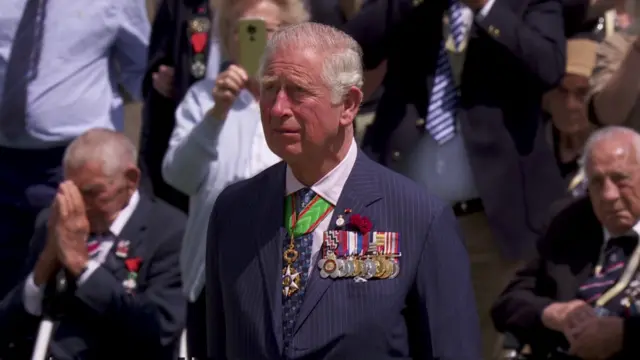
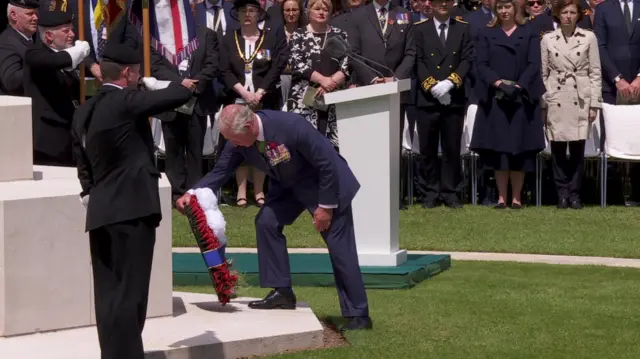
An emotional-looking Prince of Wales has led the laying of wreaths.
The wreaths are being placed beneath the giant Cross of Sacrifice which stands in the cemetery, surrounded by war graves.
He was followed by British PM Theresa May who was accompanied by the minister of the French armed forces, Florence Parly.
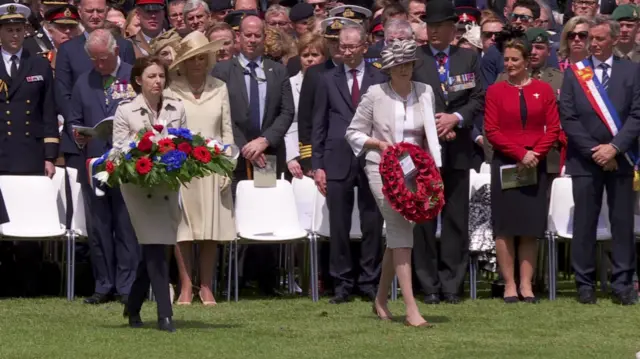
Canada's Prime Minister Justin Trudeau has spoken at a ceremony at Juno Beach, where Canadian, British, Free French and other nation's forces landed on 6 June 1944.
"13,000 Canadians stormed Juno beach that day with no guarantee of victory," Mr Trudeau said. "It was a gamble that the world had never seen. But when duty called Canadians from coast to coast to coast answered."
"Francophones, Anglophones, indigenous peoples, new Canadians, came together as one."
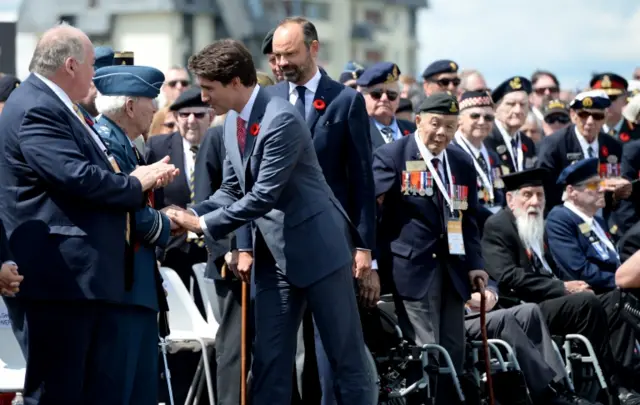 Image source, AFP/Getty
Image source, AFP/GettyBefore his speech, Justin Trudeau met with veterans at the event on Juno Beach
In Staffordshire...
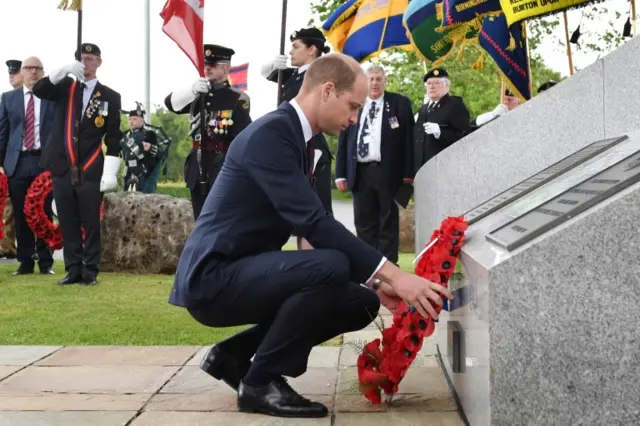 Image source, Getty Images
Image source, Getty ImagesPrince William laid a wreath as a mark of respect at the National Memorial Arboretum
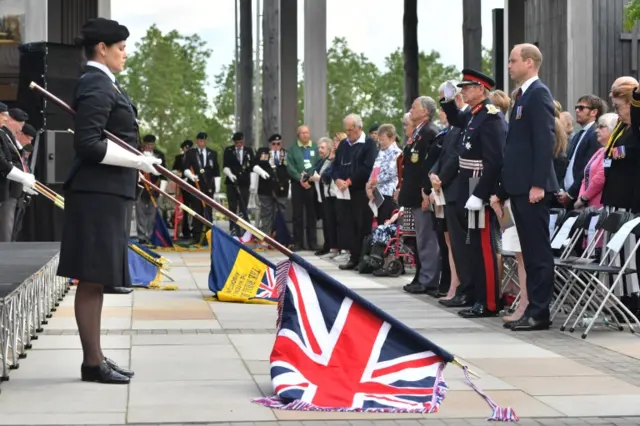 Image source, Getty Images
Image source, Getty ImagesThe Duke of Cambridge then gave a speech, thanking WW2 veterans
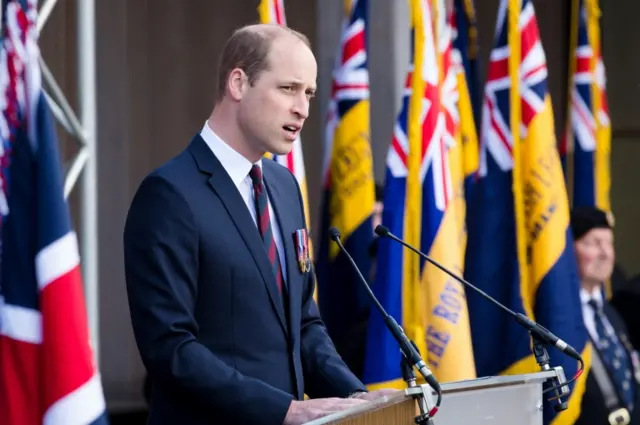 Image source, EPA
Image source, EPAAt the Bayeux war cemetery...
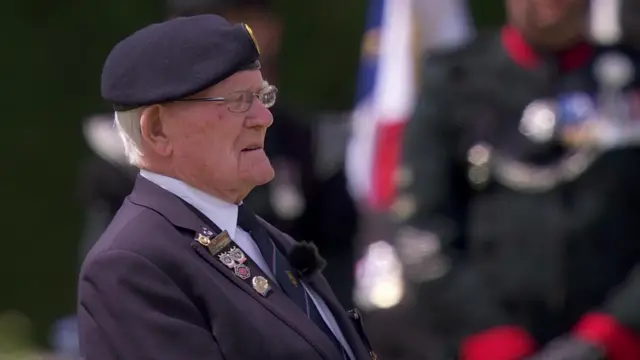
Frank Bough
We have just heard a moving account of D-Day from Navy veteran Frank Bough at the service in Bayeux.
Now aged 95. he had trained as a signal man, and was among those British sailors sent on "special duty" to the US to pick up the landing craft used on D-Day.
"They were 150ft long, 25ft deep and they were flat-bottomed - I wouldn't recommend them for cruising," he joked.
En route to the beaches of Normandy his ship came under fire and received a direct hit.
"My most abiding memory of that day is of seeing our boys - we'd been talking to them just minutes before - they were cut down with machine gun fire. It was pretty bad at that time.
"They fell into the water, floating face down and we couldn't get them out, we couldn't help them. That is my most abiding memory and I cannot forget it."
 BBC Radio 5 Live
BBC Radio 5 Live
D-Day veteran Eric Strange spoke to his granddaughter, Michelle, about the moment he landed on the beaches at Normandy.
"We were certainly going to be victorious, we couldn't possibly lose," Eric told her.
Does your family have a connection to D-Day? Text BBC Radio 5 Live on 85058 or tweet @bbc5live, external
Eric Strange landed on the beaches at Normandy as part of the Allied invasion.
In Colleville-sur-Mer...
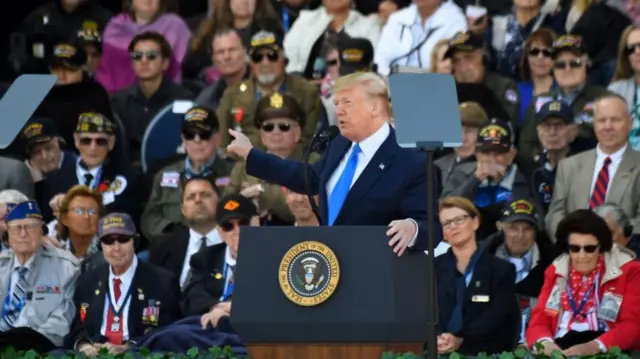 Image source, Getty Images
Image source, Getty ImagesEnding his speech, President Trump said the "exceptional might" of US forces on D-Day "came from a truly exceptional spirit".
"We knew how brave they were. They came here and saved freedom. And then they went home and showed us all what freedom is all about," he said.
"Those who fought here won a future for our nation. They won the survival of our civilisation. And they showed us the way to love, cherish and defend our way of life for many centuries to come."
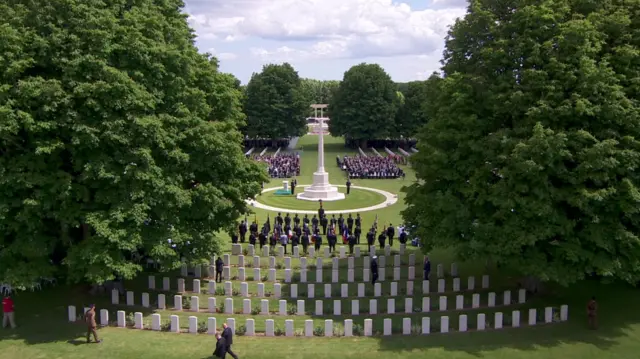
Prayers have been said and hymns sung among the graves of those who died in the Normandy operation in Bayeux.
Earlier, a broadcast by the BBC Home Service which announced the news of the D-Day assaults to the British public was played to the crowd.
Nicholas Davis shares images of a postcard sent from France
Nicholas Davis from Andover, Hampshire told the BBC his dad used to show him images of a postcard sent from his great-grandfather, Charles Davis.
Charles served with the Royal Artillery and was a range finder on the heavy 3.7 inch anti-aircraft gun.
He landed on Gold beach on 6th June 1944 and went on into Cean.
Nicholas said: "Here is a photograph of a postcard he brought back and written on the back is: "This is the place where I landed in France".
“I never got to meet my great-grandfather, but these things make me feel close to him. They also sparked my life-long love of history. I remember my dad showing them to me as a child.
“Seeing these photos gives me a great sense of pride in my great-grandfather.”
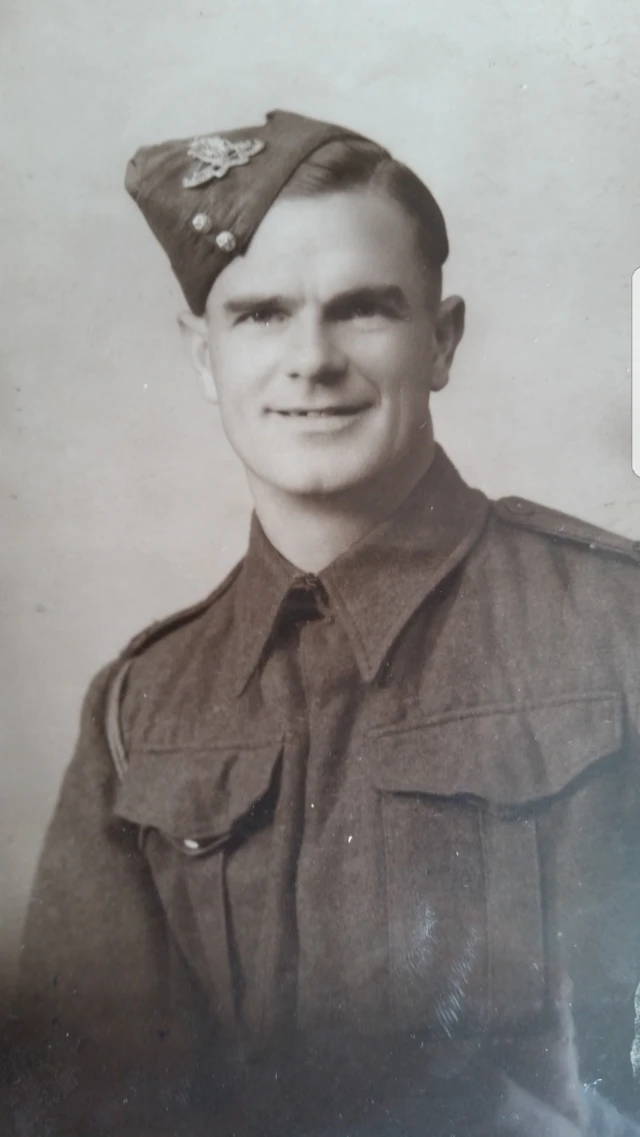
Charles Davis served with the Royal Artillery
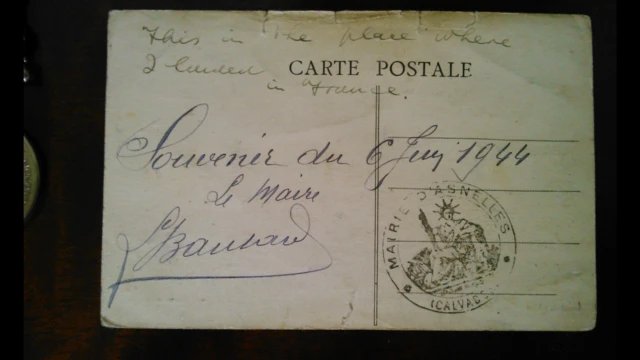
The back of the postcard which reads "this is the place where I landed in France"
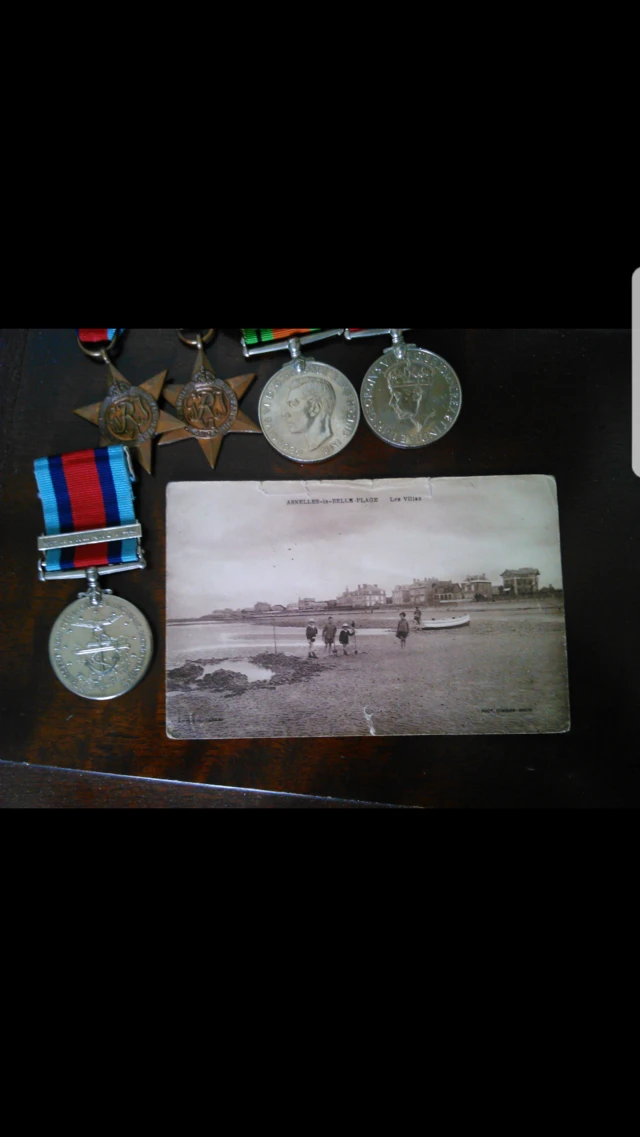
Nicholas treasures the medals and postcard sent by his great-grandfather
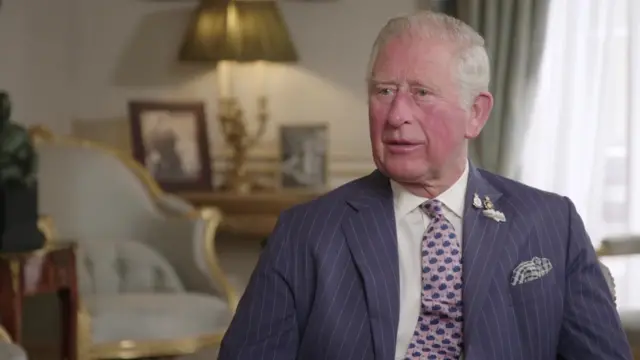
Prince Charles has said the new memorial to the fallen British troops will help "immortalise" their memory.
"This country lost so many, countless, special people," he told BBC News.
"We owe it to them and their families to go on commemorating this."
He called those who served "remarkable young people, who above all, wanted to do their duty."
President Trump has praised French civilians and Resistance fighters. "These were great people," he said. "These were strong and tough people."
He thanks the granddaughter of one Resistance fighter, who works as a guide at the Normandy sites, "for keeping alive" memories of D-Day.
At the Bayeux war cemetery...
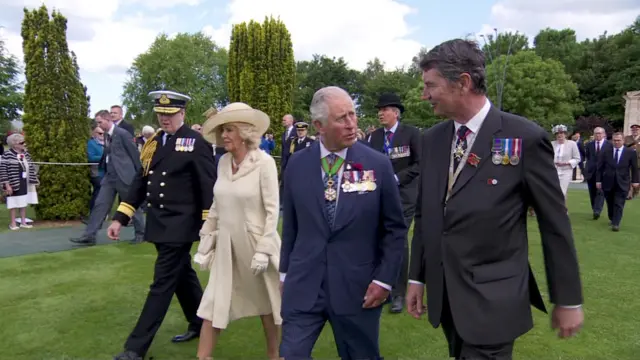
The British national anthem is played as the Prince of Wales and Duchess of Cornwall arrive at the war graves in Bayeux - the first French town to be liberated.
Today's commemorations will no doubt mean a lot to the royal couple.
Prince Charles is, of course, a regular at these events and his grandfather King George was on the throne on D-Day.
Camilla's father won a military cross during the Second World War and she is great great great granddaughter of Sir Allan MacNab, the former prime minister of the province of Canada. Some 359 Canadian soldiers died on D-Day.
Later, the prince will host a reception for veterans.
In Colleville-sur-Mer...
President Trump is now singling out particular veterans for thanks and praise.
Ray Lambert landed on Omaha Beach and helped dragged comrades to safety before he himself was badly wounded.
“At 98 years old, Ray is here with us today, with his fourth purple heart and his third silver star from Omaha,” President Trump said. “Ray, the free world salutes you.”
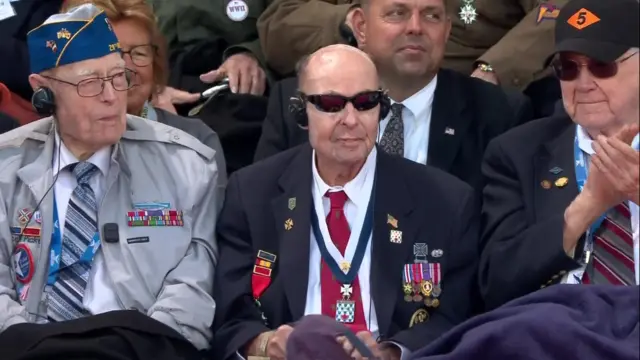 Image source, EBU
Image source, EBUIn Colleville-sur-Mer, President Donald Trump has given fulsome praise to veterans of D-Day.
Calling Normandy "freedom's altar", he paid tribute to men he called "among the very greatest Americans who will ever live".
"You are the pride of our nation. You are the glory of our republic. And we thank you from the bottom of our hearts."
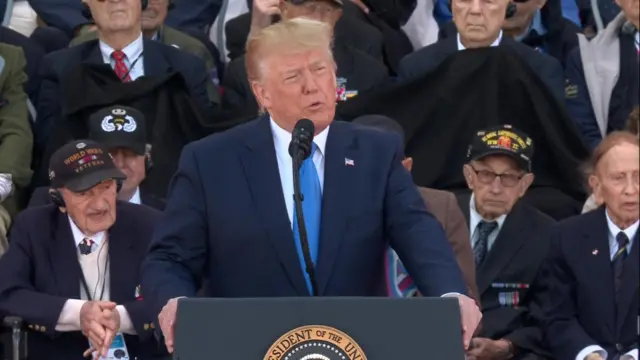 Image source, EBU
Image source, EBUThe French president awards a group of five US veterans the country's highest honour, the Légion d'honneur, for their help liberating France.
Mr Macron said it was "a way to say, after 75 years, that we know what we owe to the USA."
"Long live the United States of America," Mr Macron ends his speech. "Long live France. And long live the friendship between our nations."
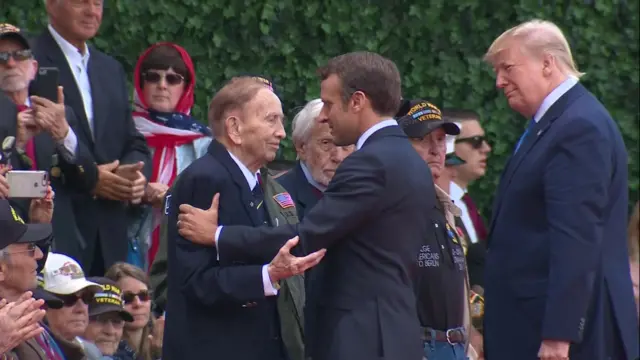 Image source, EVN
Image source, EVNAt the Bayeux war cemetery...
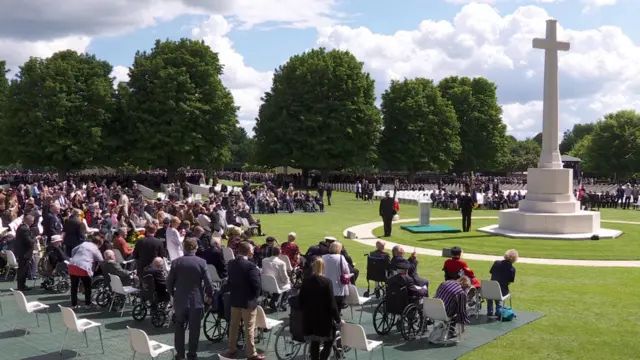
Shortly, we will re-hear the 1944 recording of the code that was broadcast by the BBC from London to the French Resistance.
Six words were used from a poem entitled Chanson d'automne by French poet Paul Verlaine.
"Les sanglots longs, Des violons, De l'automne" ("The long sobs of autumn violins").
D-Day was coming.
Emmanuel Macron speaks at the US cemetery at Colleville-sur-Mer.
"What resonates still 75 years later is their incredible courage," Mr Macron says of the Allied troops. He praised their fortitude, that "took them thousands of miles from home to free a land they had never set foot in".
"France has not forgotten those fighters to whom we owe the right to live in freedom."
In English, Mr Macron thanked the veterans in attendance on behalf of France, to a round of applause.
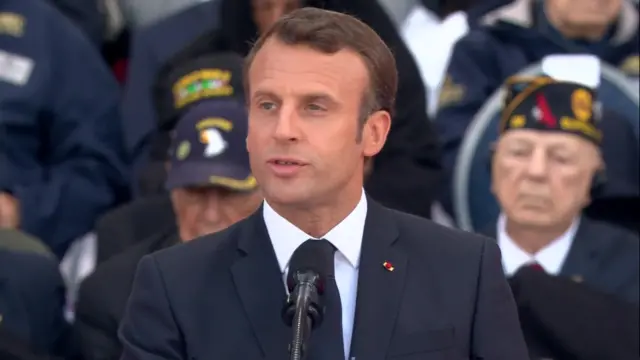 Image source, EBU
Image source, EBU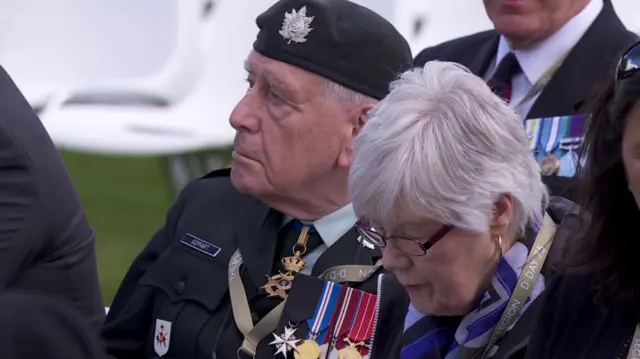
Veterans have been joined by UK PM Theresa May and Prince Charles at the Bayeux war cemetery.
Thousands of French citizens also paid the ultimate sacrifice on D-Day.
Despite warning leaflets being dropped over Normandy on the morning of the operation, thousands were killed.
Historian Frederick Jeanne's grandfather was in Bayeux on D-Day and saw soldiers liberate Bayeux the following day.
He told BBC One: "It was the best day of his life, he always remembered that day as a huge release because the Germans were gone."
Just days later General Charles De Gaulle, leader of the Free French, arrived in Bayeux from his safe haven in London.
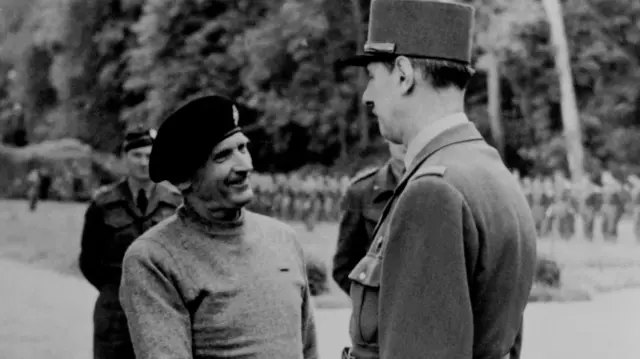 Image source, AFP
Image source, AFPDe Gaulle meets field Marshal Bernard Montgomery in Bayeux on June 14, 1944.
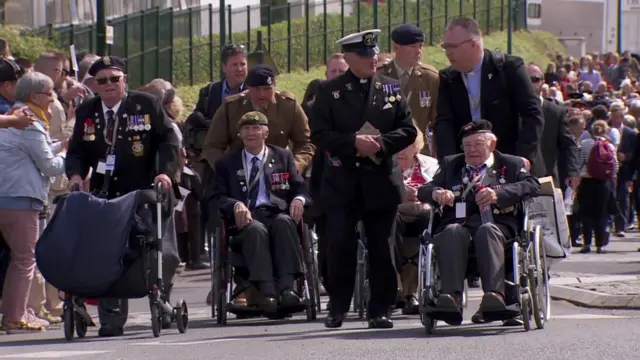
Many veterans in Bayeux have insisted on making their own way from the cathedral service to the cemetery for the next part of the commemorations.
The cemetery contains 4,648 war graves, mostly of those who died in the invasion of Normandy.